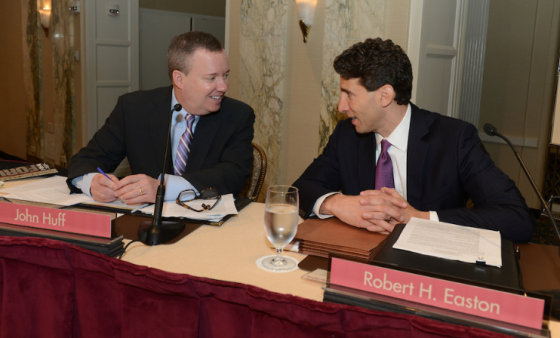Photo by Don Pollard
NEW YORK—Insurance industry experts in a panel discussion agreed that while terrorism risks are changing, they believe the Terrorism Risk Insurance Act (TRIA), set to expire Dec. 31, 2014, will be reauthorized by Congress. In fact, a poll taken at the annual Property/Casualty Insurance Joint Industry Forum found that 93% of attendees believe TRIA will be renewed.
“In the U.S., we’re moving away from the risk of catastrophic-scale terrorism. But we are probably more likely to have the Boston Marathon type of terrorism,” said Stephen Flynn, professor of political science and founding director of the Center for Resilience Studies at Northeastern University in Boston.
The reasons are that, “The know-how to carry out these low-end acts is pervasive and the opportunities for this type of terrorism are relatively high. Because they can be conducted on a small scale, they are difficult to plan for in advance and intercept,” he explained, adding, “In my mind there is no question that the feds need to play a backstop role. This isn’t a natural market. It’s not a natural disaster environment. The role an industry can play in educating about risk and engaging mitigation measures is a very useful public policy outcome of the feds playing a role as a backstop.”
The six-member panel was moderated by Julie Rochman, president and CEO of the Insurance Institute for Business & Home Safety.
Robert H. Easton,executive deputy superintendent of the insurance division at the New York Department of Financial Services [pictured above with John Huff, director of the Missouri Department of Insurance] said, “We would like to see TRIA in some form become permanent so we don’t have to have this discussion every few years.”
Easton added, “The political reality is that this is unlikely to occur, but our view is that if anybody should be taking one of the more extreme views it is New York. The program has been critical to insuring that there is sufficient capacity in the marketplace.”
Huff agreed that it needs to be renewed, but noted that TRIA should not be a “big state, small state issue.” Rather it should be supported by states of all sizes. “Missouri has a significant urban, suburban and rural presence,” he said.
Jay Gelb, managing director and senior equity analyst for Barclays believes TRIA will be reauthorized at the last minute. If reauthorization doesn’t happen, “It would be concerning from an investment viewpoint,” however, “Insurers could underwrite the exposure or limit their concentrations in target areas, especially in lines where losses cannot be excluded, such as workers compensation.”
Matthew Mosher, senior vice president and chief rating officer for the A.M. Best Company observed that while insurers can, indeed, manage the risk of terrorism, and even avoid it, “what does that do for the nation as a whole? When you look at the impact of TRIA, it comes down to how much risk you want individuals to absorb. At this point insurers are not able to provide a large amount of coverage without a backstop.”
In terms of adjustments to the program, Easton said, “We would like to see the inclusion of cyber as a risk that TRIA addresses. The cyber world is very different today than even 12 or 13 years ago.”
For the poll questions and full survey results, go to 2014 Property/Casualty Insurance Joint Industry Forum Questionnaire.

